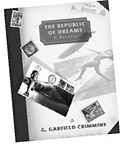MY EDITOR CALLED to tell me he had a book for me to review. “It’s either genius or trash,” he said. “In Europe it’s being heralded as the Next Big Thing.” I was flattered—but later I found out no one else in the office had wanted to touch it.
Lord of the Barnyard
by Tristan Egolf (Grove, $24)
When I looked at Lord of the Barnyard, with the rock ‘n’ roll photograph on the cover, when I looked at the back cover festooned with gushing blurbs, when I got my mind around its subtitle (“Killing the Fatted Calf and Arming the Aware in the Cornbelt”), when I read the publicity material about the author, Tristan Egolf, who, having been rejected by 70 US publishers, was discovered busking on the Pont des artes in Paris, I wandered off into a familiar reverie. What if books had no subtitles? What if there were no photos to tell us how cute/trustworthy/psychotic the author might be? Would we then, and only then, discard the fantasy and read the book with an open mind?
I suppose it’s useless to go down that road. I only offer this as evidence of my state of mind when I began to read. I think it is fair to say that I have never begun reading a book with so much distaste already in place. And I want to say that I tried, I tried, I tried to battle the growing annoyance and grinding irritation the book produced in me. But I couldn’t.
Below, you will find my reasons for disagreeing with virtually every book critic in Europe (all of them quoted, you may be sure, on the back cover of Lord of the Barnyard).
This book wants very much to be an apocalyptic novel, to show just how close we all are to utter chaos and undoing. Egolf spends a great deal of time early on announcing how events are going to spin out of control, foretelling the apocalypse in biblical language, invoking exile, martyrdom, and at one point observing “against a backdrop of decay, that all of [the town of] Baker appeared to be awaiting the arrival of the four horsemen.” But, in fact, the novel’s central event is a small-town garbage strike led by the luckless John Kaltenbrunner. It is, in fact, a series of anticlimaxes.
Kaltenbrunner’s life in Baker (a town somewhere in the cornbelt), as narrated by Egolf, has given him a lot to be angry about, “a whole lifetime of accumulated indignity behind his actions.” His father, a man of legendary status, is dead. His mother is disintegrating. School is useless to John, human relationships are distasteful, and his only solace is in farming and animal husbandry, for which he shows a remarkable proficiency at a young age (this, I imagine, is to prove that John could have done anything he wanted, had Baker only left him alone). When he loses the Kaltenbrunner property to Methodist predators waiting for his mother to die (a rather complicated business), John flies apart and holds the farm hostage in a Ruby Ridgestyle shootout. As a result, he is sentenced to hard labor on a boat for three years. When he returns to Baker, he finds himself more alienated than ever. He’s fit for only one business, as far as Baker is concerned, and that is as a garbage scrub. Conditions are terrible, it gets political, etc., etc.
I don’t mean to diminish the plot by summing it up and winding it down into a couple of abbreviations. But it is more interesting to look at why I had it in for this book from the beginning, and why a writer being compared to Thomas Pynchon, John Kennedy Toole, and William Faulkner could not redeem himself with me.
To begin with, the book is carelessly written and carelessly edited. If you’re going to be compared with Faulkner, you cannot write, “One of the most ironic things about Pullman Valley is that . . . the landscape really is beautiful. On select occasions . . . John almost felt as though he were a part of it all.” You cannot write a book about chaos of diluvian dimensions and say that it is “really unbelievable” and “heinous beyond description.” Make no mistake about it: Egolf can describe, but when he chooses to, he does so obsessively. He appears to revel in descriptions of wreckage, towering garbage, and people visiting violent acts upon each other. This enthusiasm for disaster is almost touchingly boyish. However, even mayhem suffers from repetition, and rather than giving the novel intensity (which I think is intended), it quickly becomes tedious.
And another thing: Egolf’s contempt for the characters who populate Baker—categorized variously as crones, scrubs, wetbacks, factory rats—sucks the life out of the plot. How much more frightening this story would be if a town of calm, mostly normal people found such turmoil just below the surface. In a town like Baker, one wonders at it taking a garbage strike to push the population to the edge.
I did—GRUDGINGLY—like some things about Lord of the Barnyard. I liked how what started out as a bildungsroman dissolved into a social novel. I liked John Kaltenbrunner; I pictured him as a kind of Gregg Allman figure, stalking through the novel in a leather mining coat. Egolf can, when he puts away his supermetaphorizing stun gun, write a sentence that sticks in the mind, as when he describes a set of puppy ghosts that haunt John before he holes up on the farm with his Winchester: “They perched up on Bucephalus in a sorry little row.” I liked the way John’s mother is referred to as “Madame Kaltenbrunner” throughout the book, and that Egolf has tried to write a novel without using any direct dialogue, employing as narrator the collective consciousness of the garbage crew that John rallies to strike.
The problem with Lord of the Barnyard is that Egolf tries too hard, full bore, all the time. If he had just pulled back a little, if he knew the value of restraint, he might not have drowned out the strengths in this novel.






